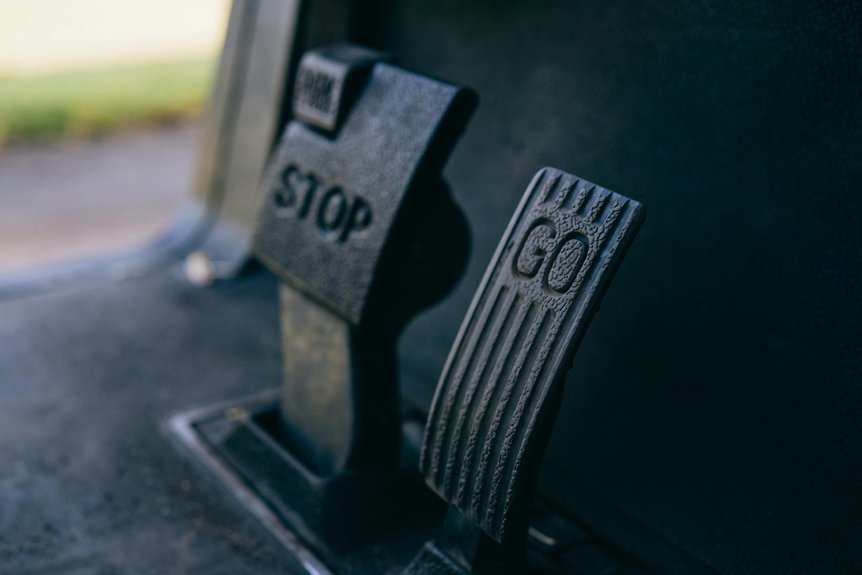If your car isn’t shifting gears smoothly, it can be frustrating and concerning. Many underlying issues could be causing this problem, from worn clutch parts to transmission fluid concerns. Identifying the exact cause isn’t always straightforward, but understanding what might be wrong can help you troubleshoot effectively. There’s a range of potential factors at play—some simple, others more complex—that you’ll want to explore to get your car shifting smoothly again.
Worn or Damaged Clutch Components
Worn or damaged clutch components are a common cause of difficulty when shifting gears. If your clutch pedal feels soft or sticks, the issue might be with the clutch disc or pressure plate. Over time, these parts deteriorate, making it harder to disengage the clutch fully.
Additionally, low or contaminated clutch fluid can impair clutch operation, causing slipping or rough shifts. Check the clutch fluid level regularly and ensure it’s clean.
If you notice resistance or unusual sensations when pressing the clutch pedal, it’s a sign you may need to replace worn parts or address fluid issues to restore smooth gear shifts.
Low or Contaminated Transmission Fluid
Have you checked your transmission fluid recently? Old or contaminated transmission fluid can cause shifting issues, making gear changes rough or delayed. Proper maintenance of high-quality transmission services helps ensure smooth operation and prevents costly repairs. Over time, transmission fluid age reduces its lubricating and hydraulic properties, leading to poor clutch engagement. Fluid leaks also lower the fluid level, which affects transmission performance. If the fluid appears dark, gritty, or smells burnt, it’s a sign it needs replacing. Regularly inspecting and maintaining proper fluid levels prevents contamination and guarantees smooth gear shifts. Neglecting this simple step can lead to more serious transmission problems down the road, so prioritize fluid health for ideal driving.
Faulty Shift Linkage or Cables
If your car isn’t shifting gears smoothly, a faulty shift linkage or cables could be the culprit. Over time, the shift linkage can become misaligned, requiring a shift linkage adjustment to restore proper gear engagement.
Worn gear synchronizers may also cause difficulty shifting, but issues with the linkage often produce noticeable resistance or sloppy shifts. Inspect the cables for looseness, fraying, or corrosion, and confirm the linkage is properly connected.
Correcting these issues can improve gear transitions and prevent further damage. Regular maintenance of the shift linkage and cables helps keep your transmission shifting smoothly and prolongs its lifespan.
Internal Transmission Failures
Internal transmission failures can cause your car to hesitate or struggle to shift, even when the external components seem fine. Issues like worn clutch plates or damaged gears disrupt smooth operation.
You might notice the clutch pedal feels different, which could signal a need for clutch pedal adjustment. Additionally, a transmission fluid change can prevent internal damage by ensuring proper lubrication.
Failing to address internal issues can lead to further damage and costly repairs. Regular maintenance, including checking the clutch and fluid levels, helps prevent these failures.
If shifts remain rough despite adjustments, it’s time to have a professional inspect for internal transmission problems.
Issues With the Transmission Control Module
Problems with the transmission control module (TCM) can often cause your car to hesitate or shift roughly, even when internal transmission components are in good shape. The TCM relies on electronic sensors to monitor engine and transmission performance, then adjusts shift timing accordingly.
If these sensors malfunction or send incorrect data, shifting becomes jerky or delayed. Additionally, outdated or corrupted software can impair TCM function.
Regular software updates from your dealer can fix bugs and improve communication between sensors and the module. Ensuring the TCM and sensors are in good condition is essential for smooth gear shifts and overall transmission health.
Conclusion
If your car isn’t shifting smoothly, don’t ignore the signs. Worn clutch parts, low or dirty transmission fluid, faulty linkages, or internal transmission issues could be causing the problem. It’s best to get a professional inspection to identify and fix the issue early. Regular maintenance can prevent future problems and keep your car shifting seamlessly. Stay attentive to how your car drives, and don’t hesitate to seek help when needed. To schedule your free TransScan or to book an appointment, call us today at (919) 471-2506 or visit us online at Durham Transmission.

